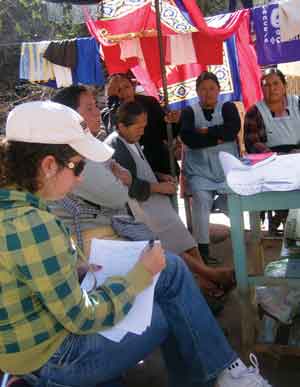Editor’s Note: This article was published originally in the Spring 2012 edition of CLLAS Notes, the newsletter of the Center for Latino/a and Latin American Studies.
by Alejandra Garcia Diaz Villamil

How have communal banks in Bolivia impacted the empowerment of women entrepreneurs, particularly in terms of decision-making, leadership, participation in community associations, and self-esteem?
The focus of my research is to bring to light the efforts and struggles of indigenous Bolivian women in peri-urban areas. I provide testimony of some of the inequalities along gender lines in Bolivia. In particular, I focus on women’s struggle to become more independent by being entrepreneurs while still being able to be good wives and mothers. The resulting balancing act proves difficult when faced with wage disparity, discrimination, and lack of participation in business opportunities. Nevertheless, women find their calling when they begin a business and are able to generate their own income. Consequently, their self-esteem drastically improves, and they feel greater equality to their male counterparts.
The business case for targeting women is that women have higher repayment rates, invest in their family more than males, and are poorer than males. Therefore, targeting women is both profitable and sustainable for microfinance institutions. Simply targeting women and increasing women’s income is not enough to obtain gender equity.
Access to credit is one way that Bolivian women integrate into the economy and obtain income. However, the question of whether or not loans from nonprofit microfinance organizations results in empowerment, or at least steps toward greater equity in Bolivia, needs more research. With this in mind, my study looks at whether or not this poverty reduction strategy not only alleviates poverty and offers access to credit for women, but more importantly, whether female entrepreneurs are empowered by providing greater access to participation in leadership roles, community associations and greater decision-making in the business and household.
A native Bolivian, I conducted this research primarily in partnership with Center for Alternative Projects and Studies for Development (CEPAD) and CRECER (a communal bank, Bolivian MFI). It was also supported with information by Foro Latino Americano y del Caribe de Micro Finanzas Rurales (FOROLAC) and FINRURAL (Association of Micro Finance Organizations of Bolivia.) Additionally, this research was supported by a CLLAS graduate student research grant. ■
—Alejandra Garcia Diaz Villamil, UO MPA Candidate 2012, M.A.L.P.S. Gender and Women Studies, Armstrong Atlantic State University.
